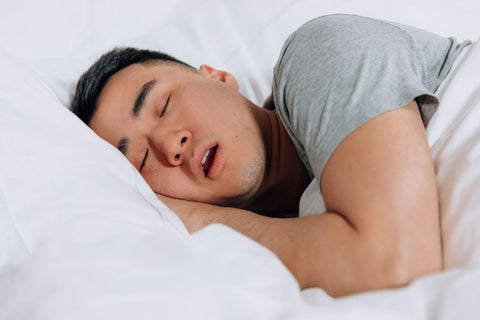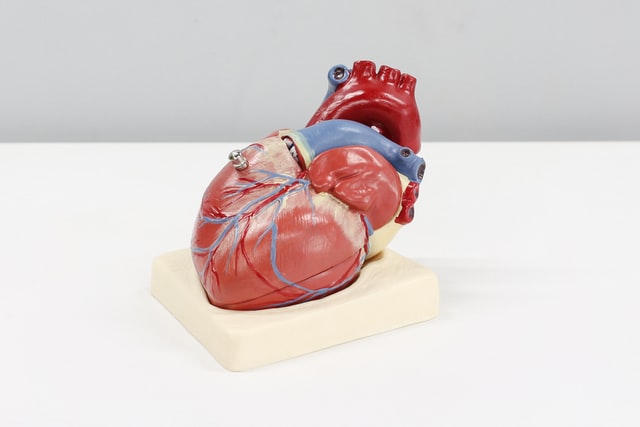Heart disease is the leading cause of death in the United States, so it makes sense that protecting heart health is at the forefront of most Americans' minds.
Most of us know that watching what you eat and moving your body regularly is important for keeping your cardiovascular health in tip-top shape.
What if there was more to it, like getting enough quality sleep?
A lack of sleep is directly linked to a decline in cardiovascular health. Don’t miss a beat by turning your attention to your sleep quality.
The Link Between Disordered Sleep and Heart Disease
If you suffer from a sleep disorder, your risk for developing heart conditions like arrhythmias, coronary artery disease, plaque buildup, and even heart failure is much higher than the average person.
Moreover, insomnia, sleep apnea, and restless legs syndrome are all linked to a higher risk of heart disease.
Sleep disturbances are known to either shorten or interrupt your sleep, which is where the main problem lies.
Research shows that a lack of sleep or disrupted sleep quality is associated with high blood pressure, increased cholesterol levels, and atherosclerosis.

Disturbed sleep is also known to cause other health conditions that lead to cardiovascular events, such as inflammation, weight gain, and diabetes.
It all ties back to your heart rate during sleep.
In most people, blood pressure decreases during sleep. However, in some people with sleep disorders like narcolepsy, this dip in blood pressure doesn’t happen.
Your Heart Rate During Sleep
If you track your heart rate with a fitness watch, you likely know how your pulse changes throughout the day based on your activity level.

When you’re sitting still, your heart enters a baseline known as your resting heart rate, which includes a certain amount of beats per minute.
To check your resting heart rate, begin by feeling for your pulse. Once you can feel it, start a timer for 15 seconds, counting the number of beats within that duration of time.
Then, multiply the number of beats by four to find the number of beats per minute.
Most people have a resting heart rate between 60 and 100 beats per minute. The lower your resting heart rate, the better your heart health (assuming it isn’t too low, that is).
When you move around or face intense emotions, your heart rate will spike. What about your heart rate while sleeping? Well, it depends on the phase of sleep you’re in.
- Light sleep:Within five minutes of falling asleep, your body should enter its normal resting heart rate.
- Deep sleep: Your heart rate should slow to around 20 to 30 percent below your normal resting heart rate.
- Rapid Eye Movement (REM) Sleep: Since this is the phase of sleep where most of our dreaming occurs, your heart rate will vary based on the activity taking place in your dream.
A fitness tracker or smartwatch can help you keep a close watch on your heart rate during sleep.

If your heart rate doesn’t decline during sleep, or it increases to a higher level than your resting heart rate, consult your doctor.
High heart rates during sleep may indicate anxiety, atrial fibrillation, or even sleep apnea.
Sleep Apnea’s Affect on Heart Rate While Sleeping
Your breathing rate should decline along with your heart rate while sleeping.
If your breathing and heart rates vary wildly during sleep, it may indicate that you’re suffering from a sleep disorder like sleep apnea.
Sleep apnea causes lapses in breathing as you sleep, disrupting oxygen levels and, in turn, stress levels across the body.
A normal breathing pattern throughout the night is anywhere from 12 to 20 breaths per minute, and breaths should be slow, steady, and consistent.
In sleep apnea sufferers, repetitive lapses in breathing cause stress for the entire cardiovascular system, placing the body in a state of fight or flight.

As oxygenation in the blood decreases, the body is starved of oxygen, activating the sympathetic nervous system to respond to perceived danger.
After a pause in breathing, sleep apnea patients then gasp for air, which sometimes causes them to wake up. Blood vessels constrict, heart rate rises, and blood pressure shoots up.
It’s no surprise, then, that sleep apnea patients are two to four times more likely to develop abnormal heart rhythms than the general population.
Moreover, sleep apnea increases the risk of heart failure by a whopping 140 percent.
As if that wasn’t frightening enough, sleep apnea causes fragmented sleep and sleep deprivation, which is known to increase the risk of heart disease, heart attack, and stroke.
So how do you know if you have sleep apnea? And what can you do to treat it and protect your health?
Common symptoms include:
- Snoring
- Gasping for air or choking
- Pauses in breathing during sleep
- Insomnia
- Daytime grogginess
- Irritability
- Dry mouth
- Headache
Talk to your doctor if you suspect a sleep disorder. A sleep study can usually determine whether or not you suffer from sleep apnea.

Common treatment includes the use of a continuous positive airway pressure (CPAP) machine.
However, even with the use of a CPAP machine, mouth breathing may still fragment your sleep, whether you have sleep apnea or not.
From the Bottom of Our Heart, Tape Your Mouth!
Mouth breathing is a dysfunctional form of breathing known to elevate your heart rate during sleep, yet so many of us do it.
A recent study showed that more than half of us are chronic mouth breathers, and it’s associated with diminishing our quality of life.

Mouth breathing unnecessarily activates our stress responses, keeping us on high alert to respond to danger. Over time, this has serious consequences on the body.
Nasal breathing, however, brings the body and mind back to a state of equilibrium, lowering blood pressure, heart rate, and boosting overall health.
It’s one thing to focus on the way you breathe during waking hours, but what about when you hit the hay?
Mouth taping ensures that you’ll maintain a proper lip seal no matter what the night throws your way.
As a result, you’ll experience snore-less, restorative sleep full of slow, steady nasal breathing known to regulate your heart rate and stress levels.
@somnifix Would you try this weird #healthhack for better #sleepquality ❓😴⏰ #mouthtape #didyouknow #learnontiktok ♬ Feel No Ways - Drake
Sleep apnea sufferers can even use mouth tape in combination with CPAP treatment to prevent mouth leaks. Moreover, you’ll wake up free from a dry mouth, morning headache, and more.

SomniFix Mouth Strips are so comfortable, you’ll forget you have one on. Our strips are also free of harmful chemicals known to irritate the skin.
SomniFix is one of the most effective tools for boosting heart health, sleep quality, and overall wellbeing! Pop on a strip tonight – your heart will thank you.



